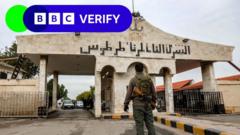Saudi Arabia and the United Arab Emirates are proceeding with careful consideration in their dealings with Syria's new leadership after the recent overthrow of long-time dictator Bashar al-Assad.
Saudi Arabia and UAE Navigate the Changing Landscape in Post-Assad Syria

Saudi Arabia and UAE Navigate the Changing Landscape in Post-Assad Syria
In light of Bashar al-Assad's recent ousting, Gulf powers approach Syria's new regime with caution.
In a significant geopolitical shift, the fall of Assad has created an opening for Gulf states to engage with Syria, previously a staunch ally of Iran. For nearly two decades, the rich monarchies of the Gulf, particularly Saudi Arabia and the UAE, have competed with Tehran for regional dominance. Now, with Iran potentially sidelined, the Gulf nations are eyeing the opportunity to establish connections with the emerging government in Damascus.
However, this cautious approach comes from a deep-rooted concern regarding the ideological orientation of the prevailing rebel forces, namely Hayat Tahrir al-Sham, which has been associated with extremist factions, including Al Qaeda in its history. The Gulf states have spent years actively working to combat the proliferation of politically Islamist movements, opposing groups like Al Qaeda, the Islamic State, and the Muslim Brotherhood.
Public statements from Gulf officials indicate a clear stance: the new Syrian leadership must prove its commitment to inclusivity, recognizing the nation’s mosaic of diverse religious and ethnic groups, before securing support in any form—financial or political. Anwar Gargash, a key diplomatic adviser for the UAE, reflected this stance, expressing serious reservations about the connections and past activities of current rebel factions.
As the situation unfolds, the actions and policies adopted by Saudi Arabia and the UAE will significantly influence the future trajectory of Syria amidst an environment of political change and uncertainty.
However, this cautious approach comes from a deep-rooted concern regarding the ideological orientation of the prevailing rebel forces, namely Hayat Tahrir al-Sham, which has been associated with extremist factions, including Al Qaeda in its history. The Gulf states have spent years actively working to combat the proliferation of politically Islamist movements, opposing groups like Al Qaeda, the Islamic State, and the Muslim Brotherhood.
Public statements from Gulf officials indicate a clear stance: the new Syrian leadership must prove its commitment to inclusivity, recognizing the nation’s mosaic of diverse religious and ethnic groups, before securing support in any form—financial or political. Anwar Gargash, a key diplomatic adviser for the UAE, reflected this stance, expressing serious reservations about the connections and past activities of current rebel factions.
As the situation unfolds, the actions and policies adopted by Saudi Arabia and the UAE will significantly influence the future trajectory of Syria amidst an environment of political change and uncertainty.





















